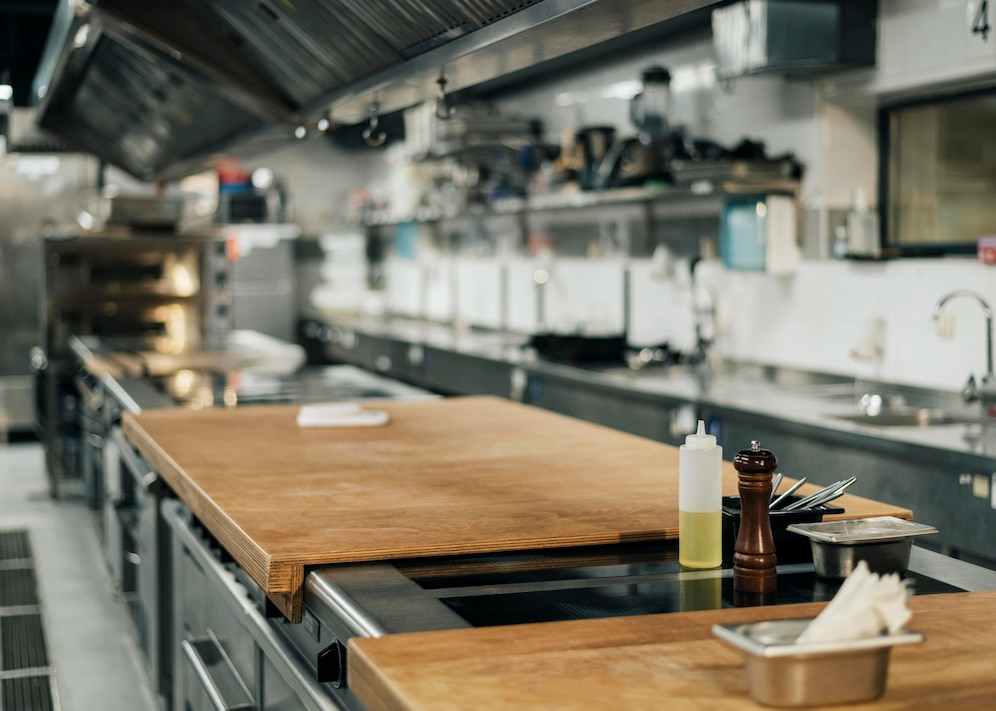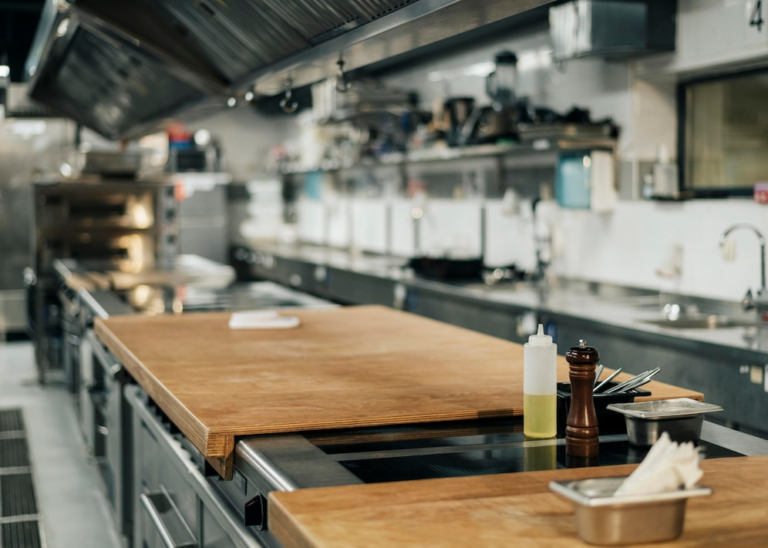Maintaining a clean and hygienic commercial kitchen is essential not only for food safety but also for ensuring smooth operations, complying with health regulations, and protecting your business’s reputation. Whether you run a restaurant, catering service, or institutional kitchen, effective cleaning practices are paramount.
In this comprehensive guide, we’ll share a range of commercial kitchen cleaning tips, delve into best practices, and answer frequently asked questions to help you keep your kitchen spotless, safe, and efficient.
By the end of this article, you’ll have a clear understanding of:
- How to organize and schedule cleaning tasks in a commercial kitchen.
- Best practices for cleaning various surfaces and equipment.
- Techniques to ensure compliance with health regulations.
- Strategies for minimizing downtime while maximizing cleanliness.
- Answers to common questions regarding commercial kitchen cleaning.
Let’s dive into the best practices that can help you create a cleaner, safer, and more efficient commercial kitchen.
Understanding the Importance of Commercial Kitchen Cleaning
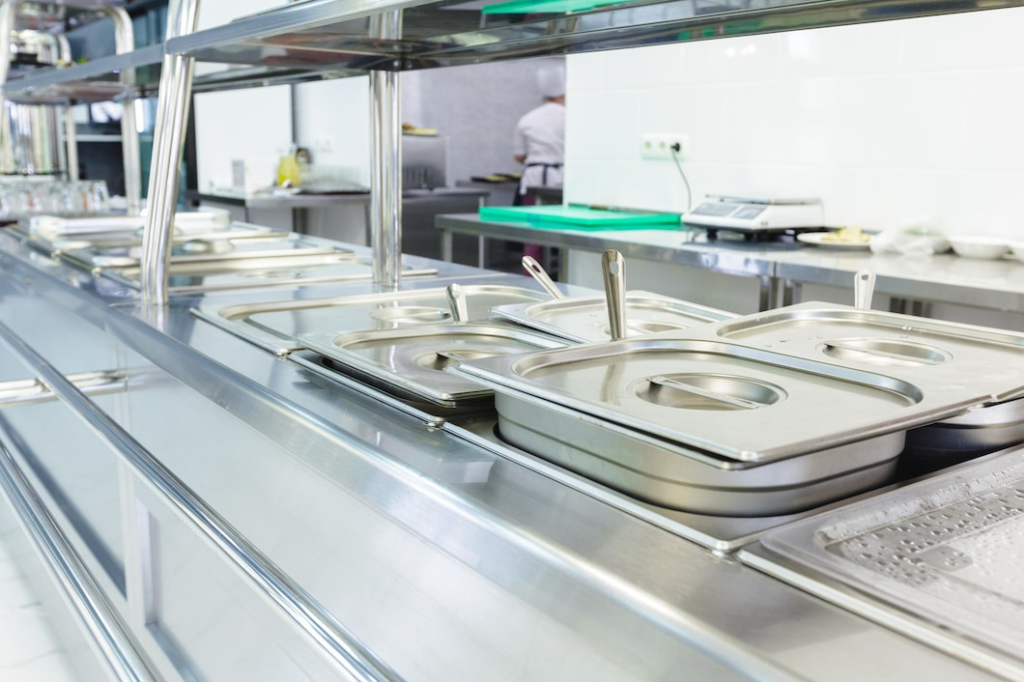
Health and Safety Compliance
Foodborne illnesses can result from inadequate cleaning practices. A dirty kitchen can become a breeding ground for bacteria, mold, and pests, jeopardizing the health of customers and staff. Regulatory agencies require commercial kitchens to adhere to strict cleaning and sanitization standards. Regular cleaning helps meet these requirements, reducing the risk of fines or shutdowns.
Enhanced Equipment Longevity
Commercial kitchen equipment represents a significant investment. Grease, grime, and food particles can accumulate on appliances, reducing their efficiency and lifespan. Regular cleaning minimizes wear and tear, helping you avoid costly repairs and replacements.
Improved Operational Efficiency
A cluttered or dirty workspace can lead to inefficiencies and even accidents. A well-organized kitchen promotes smooth operations, reduces the likelihood of cross-contamination, and creates a positive work environment for your staff.
Customer Satisfaction and Business Reputation
Clean kitchens contribute to the overall impression of a food establishment. In the age of online reviews, maintaining high cleanliness standards is critical to building trust with your customers. A spotless kitchen reassures patrons that food is prepared in a safe, hygienic environment.
Best Practices for Daily Commercial Kitchen Cleaning
Daily cleaning routines in a commercial kitchen are essential to keep the space safe and efficient. Here are some actionable tips to incorporate into your daily workflow:
1. Develop a Cleaning Schedule
Structured Routine:
Establish a detailed cleaning schedule that outlines daily, weekly, and monthly tasks. Use checklists to ensure no area is overlooked. Assign responsibilities to specific staff members and hold regular meetings to review the cleaning protocol.
Shift-Based Cleaning:
In busy kitchens, consider dividing cleaning tasks by shift. For example, implement a “before service” and “after service” cleaning routine. This ensures that the kitchen is consistently maintained throughout the day.
2. Clean and Sanitize All Surfaces
Workstations and Counters:
Wipe down all countertops, cutting boards, and preparation areas with an approved food-safe sanitizer. Use separate cloths or disposable wipes for raw and cooked food areas to prevent cross-contamination.
Cooking Equipment:
Stovetops, ovens, grills, and fryers need regular cleaning to remove grease and food residues. Ensure you follow manufacturer recommendations for cleaning these appliances. For grills and ovens, consider using specialized degreasers that can cut through stubborn buildup.
Sinks and Faucets:
Clean sinks thoroughly with disinfectants. Sinks can harbor bacteria and should be sanitized at the end of each shift. Don’t forget to clean faucet handles and the surrounding areas.
3. Floor and Wall Maintenance
Floor Cleaning:
Commercial kitchens generate spills and splatters. Sweep and mop floors frequently using a heavy-duty degreaser mixed with a sanitizing solution. Ensure the floors are dry to prevent slips and falls.
Wall and Ceiling Care:
Walls near cooking areas can accumulate grease and grime. Wipe them down weekly with appropriate cleaning agents. High ceilings and light fixtures also require periodic dusting and cleaning to maintain a dust-free environment.
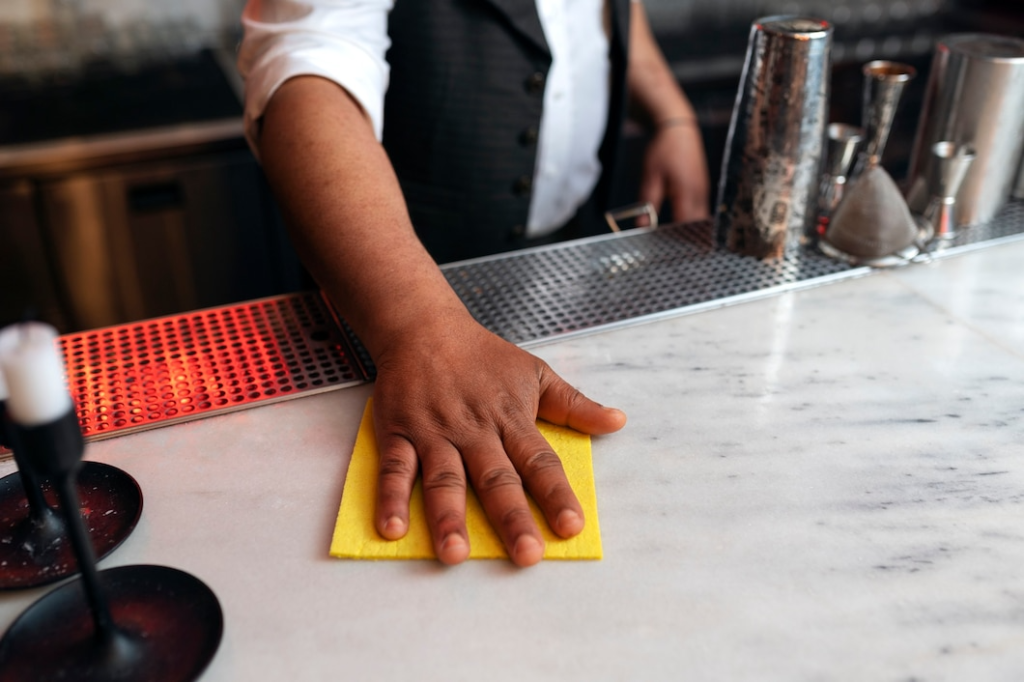
4. Manage Waste Properly
Regular Disposal:
Ensure that trash bins are emptied regularly. Use bins with tight-fitting lids and consider having multiple collection points in high-traffic areas. Keep waste areas separate from food preparation zones.
Recycling and Composting:
Implement a recycling program for materials such as cardboard and plastics. For organic waste, consider composting options that comply with local regulations.
5. Handle Utensils and Dishware with Care
Dishwashing Protocols:
Establish clear protocols for washing, rinsing, and sanitizing dishware, utensils, and cookware. Use commercial-grade dishwashers that meet temperature and sanitation requirements. Ensure that staff are trained to handle breakage and proper stacking to avoid damage.
Drying and Storage:
Allow utensils and dishware to air dry completely before storing them to prevent moisture buildup and potential microbial growth.
6. Focus on High-Touch Areas
High-touch surfaces such as door handles, switches, and control panels should be sanitized multiple times per day. These areas are often neglected but are critical for preventing the spread of germs.
7. Personal Hygiene and Staff Training
Hand Washing Stations:
Provide ample handwashing stations throughout the kitchen. Encourage staff to wash their hands frequently and use proper techniques to minimize contamination.
Ongoing Training:
Regularly train your staff on cleaning procedures, the importance of personal hygiene, and new cleaning technologies or products. Keep a log of training sessions and ensure that all employees are aware of updates in health regulations.
Specialized Commercial Kitchen Cleaning Tips
Beyond the daily routine, specialized cleaning tasks are necessary to address the unique challenges of a commercial kitchen. Here are some advanced tips to take your cleaning regimen to the next level:
1. Deep Cleaning Techniques
Scheduled Deep Cleans:
Plan deep cleaning sessions on a weekly or monthly basis. Deep cleaning involves disassembling and cleaning appliances, scrubbing walls and floors intensively, and using steam cleaning or hot water pressure washing where applicable.
Ventilation Systems:
Cleaning hoods, vents, and filters is critical for removing grease buildup and maintaining proper airflow. Grease accumulation in ventilation systems can lead to fires, so it’s important to schedule professional cleaning periodically.
2. Equipment-Specific Cleaning
Refrigerators and Freezers:
Regularly defrost and clean refrigeration units to remove expired products, spills, and mold. Sanitize interior surfaces with food-safe cleaners and ensure that door seals are intact.
Commercial Ovens and Ranges:
Use high-temperature cleaners or degreasers to remove baked-on grease from ovens and ranges. Some equipment may require disassembly for a thorough clean—follow manufacturer instructions carefully.
Slicers, Mixers, and Grinders:
These pieces of equipment often come into contact with raw food and require disassembly for deep cleaning. Clean all removable parts, lubricate moving parts as necessary, and sanitize surfaces before reassembly.
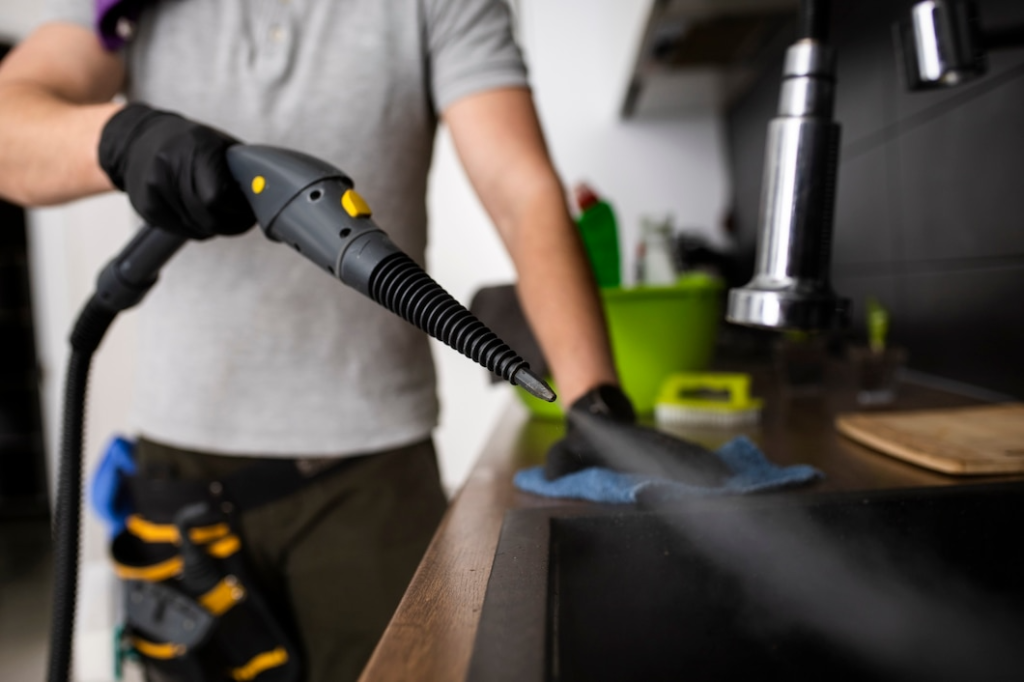
3. Implement Green Cleaning Practices
Eco-Friendly Products:
Many commercial kitchens are turning to eco-friendly cleaning products that reduce chemical exposure and environmental impact. Look for products that are certified by reputable organizations and that meet the cleaning needs of a busy kitchen.
Waste Reduction:
Integrate green cleaning practices by reducing water and chemical usage. Consider water recycling systems for mopping and eco-friendly waste disposal methods.
4. Use Technology to Enhance Efficiency
Automated Cleaning Equipment:
Invest in automated scrubbers, steam cleaners, and floor polishing machines that can perform heavy-duty cleaning with minimal manual intervention. These tools can save time and improve consistency.
Digital Checklists and Scheduling Software:
Utilize digital tools to manage cleaning schedules, track tasks, and record maintenance activities. Digital checklists can help ensure that no area is overlooked and that cleaning standards are consistently met.
5. Outsource When Necessary
While in-house cleaning is ideal for daily maintenance, certain tasks may require professional intervention. Consider hiring specialized cleaning services for tasks such as deep cleaning of ventilation systems, high-rise window washing, or equipment maintenance that requires expertise beyond your staff’s capabilities.
FAQs
1. How often should a commercial kitchen be cleaned?
The frequency of cleaning depends on the kitchen’s usage and local regulations. Daily cleaning is essential for all surfaces and equipment, while deep cleaning should be scheduled weekly, monthly, or quarterly, depending on the specific area and equipment. High-traffic areas and critical appliances may require more frequent attention.
2. What cleaning products are best for commercial kitchens?
It is important to use cleaning products that are both effective and food-safe. Look for products that are certified by health organizations and comply with local health and safety regulations. Eco-friendly options are also available, which can reduce chemical exposure and environmental impact without sacrificing cleaning power.
3. How can I ensure my cleaning protocols comply with health regulations?
Stay informed about local, state, and federal health regulations governing commercial kitchens. Regularly train your staff on these standards and keep documentation of your cleaning procedures and maintenance logs. Consulting with a food safety expert or regulatory body can help you ensure compliance.
4. What should be included in a daily cleaning checklist for a commercial kitchen?
A comprehensive daily cleaning checklist should include:
- Wiping down all work surfaces and cutting boards.
- Cleaning and sanitizing cooking equipment and utensils.
- Sweeping and mopping floors.
- Disinfecting high-touch areas such as door handles and switches.
- Emptying and sanitizing trash bins.
- Cleaning sinks and ensuring proper drainage.
- Checking and cleaning refrigeration units for spills or expired items. A detailed checklist helps ensure that every task is completed consistently.
5. Are there any specialized cleaning tips for grease management?
Yes, managing grease is one of the biggest challenges in commercial kitchens. Regularly degrease stovetops, ovens, and ventilation systems. Use appropriate degreasing agents and follow manufacturer recommendations. Schedule periodic deep cleans for exhaust hoods and ducts to prevent grease buildup and reduce fire hazards.
6. Can technology help improve kitchen cleaning efficiency?
Absolutely. Automated cleaning equipment like scrubbers and steam cleaners can handle repetitive tasks efficiently. Additionally, digital scheduling and checklist apps can help ensure that cleaning tasks are completed on time and to a consistent standard. Technology streamlines operations and reduces the risk of human error.
7. How do I train staff to maintain high cleaning standards?
Invest in regular training sessions focused on cleaning protocols, safety practices, and the proper use of cleaning equipment. Provide hands-on training and reference materials such as manuals and digital checklists. Regular feedback and refresher courses help ensure that your staff remains up-to-date with best practices.
Conclusion
A clean commercial kitchen is the cornerstone of a successful food operation. With the right cleaning strategies, you can ensure that your kitchen remains a safe, efficient, and inviting space for staff and customers alike. From establishing a structured cleaning schedule and focusing on daily maintenance to implementing deep cleaning techniques and using eco-friendly practices, every tip shared here is designed to help you maintain the highest standards of hygiene.

